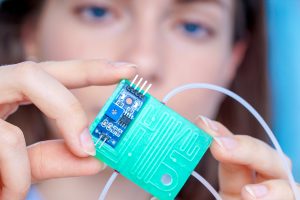 Are you wearing a personal biotracker? A current example is a smart watch or a fitness device. For seniors in the next few years, we will wear innovative biosensors that signal early detection of disease and monitor health concerns.
Are you wearing a personal biotracker? A current example is a smart watch or a fitness device. For seniors in the next few years, we will wear innovative biosensors that signal early detection of disease and monitor health concerns.
Depending on your age and health right now, you and millions of seniors will enjoy more years of vitality than your parents’ generation. We’re not just living longer, we’re living with fewer debilitating diseases. We can thank biotracking technology for this.
Biotracking software uses artificial intelligence put into wearable devices that alert us to abnormal metrics requiring further testing. In one case, a women who had irregular menstrual indicators followed up with her doctor and early detection of ovarian cancer saved her life.
Biotrackers and Your Personal Dashboard
We know more about the health of our cars than our bodies. Newer cars will tell you when a tire is low, how much gas is left, the temperature of the oil, and a multitude of other systems.
Other than when we have symptoms, we don’t get regular lab tests and we don’t know something is wrong until it is often too late. A prime example is a cancer diagnosis. Most cancers develop slowly at first—we don’t know we have tumor cells growing. But these cells are detectable and treatable at early stages.
What if we could access a personal dashboard for our health? We could monitor various levels of vitamins, enzymes, hormones and metabolic systems such as glucose and insulin. We’d be able to correct negative trends before disease sets in.
The technology is already here, but we’re not using them like we could. We can monitor our heart rate, rhythm and blood pressure. That data could tell us what to modify (diet, exercise) in order to prevent chronic disease, heat attack or stroke.
Future of Senior Health
Here are a few innovative ways already being developed:
- Skin patches: In 2017, the US FDA approved a glucose sensor that you stick on your skin for real-time measurement.
- Your smart phone or watch: Imagine having a constant readout of your blood sugar on your phone or watch. You might not keep eating that cheesecake or drink another cocktail.
- Sweat: We already have the technology to identify diseases, diet changes, injuries and stress through sweat.
- Breath: Companies are working on handheld breath analyzers that can diagnose cancer, infectious diseases, and inflammatory diseases.
- T-shirts and underwear: Other innovators are looking at designing clothing with sensors that track key biomarkers.
- Car seats: Automotive engineers are exploring inserting biosensors in car seats that would send an alert to your dashboard or doctor if there’s something amiss in your heart rate or breathing pattern.
Fitness Trackers and Smart Watches
Currently many seniors wear a smart watch like the Apple, Google Watch, or fitness trackers like Fitbit and Garmin. These are a step in the right direction of biotracking, but most are limited to heart rate without a lot of other bio-sensing.
Wearable technology in healthcare includes electronic devices that consumers can wear, like Fitbits and smartwatches, and are designed to collect the data of users’ personal health and exercise. US consumer use of wearables jumped from 9% in 2014 to 33% in 2018, according to Accenture.
Biosensors and the Future of Senior Health
According to the same article in BusinessInsider, biosensors are up and coming wearable medical devices that are radically different from wrist trackers and smartwatches. The Philips’ wearable biosensor is a self-adhesive patch that allows patients to move around while collecting data on their movement, heart rate, respiratory rate, and temperature.
Independent research showed this device registered an 89% reduction in patient deterioration into preventable cardiac or respiratory arrest. Wearable technology incentivizes behaviors that reduce hospital visits and readmissions due to poorly managed personal health—75% of users agree that wearables help them engage with their own health.
Self-Monitoring Your Senior Health
I think many seniors will agree that monitoring their own health to minimize doctor and hospital visits is a good idea.
Personally, my husband and I have enrolled in a program called InsideTracking.com, whereby we get our blood tested on multiple health metrics along with DNA sequencing. Then the company sends us individual analyses and recommendations on nutrition and preventive care.
What are you doing to remain fit and healthy? We’d love to hear from you.

Recent Comments